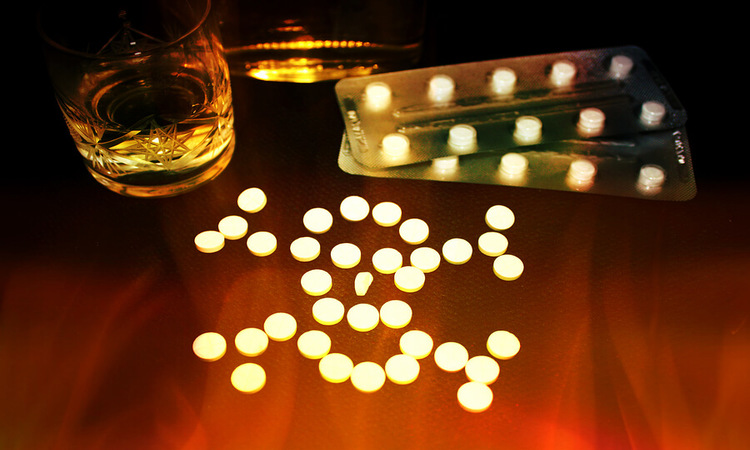
Alcohol is an intoxicating substance found in hard liquor, beer, and wine. Klonopin (clonazepam) is the brand name for an anti-anxiety medication in the benzodiazepine family, and like alcohol, it is a central nervous system depressant. Under no circumstances is it considered safe to combine the two.
Effects of Klonopin and Alcohol
Alcohol, when consumed alone, can induce effects such as the following:
- Slurred speech
- Euphoria
- Depression
- Aggression
- Impaired coordination
- Memory loss (blackouts)
- Nausea and vomiting
- Irregular breathing
- Elevated heart rate
Drinking alcohol regularly and in excess can also lead to chronic health problems, including fatty liver or cirrhosis, hepatitis, pancreatitis, arrhythmia, high blood pressure, and an increased risk of some types of cancer.
Klonopin is a prescription medication, and while a medical professional should tightly control the dosing schedule, it is possible to consume too much and experience side effects, which may include the following:
- Drowsiness or sleepiness
- Blurred vision
- Slurred speech
- Loss of memory
- Difficulty concentrating
- Headache
- Impaired coordination
- Loss of appetite or vomiting
- Sleep disturbances
It is possible to use either one of these drugs responsibly, but the two should never be combined even with a legitimate prescription for Klonopin. It is also very important not to abuse/misuse these drugs together because they can quickly compound the effects of each other, which can result in a higher risk of overdose, hospitalization, and death.
Can You Mix Klonopin and Alcohol?
Both alcohol and Klonopin and are central nervous system depressants. In prescription doses of Klonopin, this property relaxes the individual and calms nerves, helping a person who suffers from anxiety to function normally. Unfortunately, this calming effect can also produce addictive behaviors. CNS depressants used in conjunction can lead to increased drowsiness as well as profoundly depressed respiration and heart rate.
Because both Klonopin and alcohol are both consumed orally, it is also possible that this slow method of metabolization can increase the risks of side effects, as more of the substances enter the person’s bloodstream.
The biggest danger of mixing Klonopin and alcohol, however, is that these drugs compound the effects of one another. Moreover, when alcohol and Klonopin are used together, even in small doses, the combined intensified effect can lead to extreme drowsiness, severely impaired coordination, and an increased risk of a serious fall or injury. This effect can also mean the person will be difficult to rouse, which could result in a coma.
Depressed or difficulty breathing is a potentially fatal side effect of combing alcohol and Klonopin, and is an indication that the person is probably not receiving enough oxygen. A hallmark symptom of a lack of oxygen is pale or clammy skin or blue tinting around the lips or under the fingernails (cyanosis). If left untreated without emergency medical help, the person could stop breathing and die.
A recent study performed by the Substance Abuse and Mental Health Services Administration (SAMHSA, 2014) found that 38% of emergency department visits involving benzodiazepines combined with opioids or alcohol resulted in a more serious outcome, such as hospitalization, or in some cases, death.
Treating Alcohol Withdrawal with Benzodiazepines
If a person has an addiction to alcohol and they seek treatment to stop abusing this drug, a physician may prescribe a benzodiazepine such as Klonopin to reduce the symptoms of withdrawal. Anxiety and seizures are two significant symptoms of alcohol withdrawal, and benzodiazepines have been shown to be very effective at mitigating the risk of severe symptoms such as these. In this way, benzos can make the person’s transition away from alcoholism easier.
However, it is vital that the overseeing physician carefully monitor the patient for signs of a burgeoning dependence on benzodiazepines. These medications come with their own potential for abuse and addiction. Such a development can be particularly dangerous if the individual experiences a relapse and combines a Klonopin prescription with alcohol use.
Help for Alcohol or Klonopin Addiction
For those who suffer from an addiction to either Klonopin or alcohol, it is critical to seek help as soon as possible to address the problem before it gets any worse. If these disorders are left untreated, the person may become more likely to use alcohol and benzodiazepines together or to combine these drugs with others such as heroin and prescription painkillers.
Comprehensive addiction treatment is usually the most effective way to address polysubstance abuse disorders. Medical supervision allows clients to withdraw from substances safely, while emotional support from therapists and peers helps clients to discover the roots of their substance abuse and develop better coping mechanisms for dealing with stress and cravings.
Recovery By The Sea is dedicated to helping clients achieve abstinence indefinitely, providing them with the skills and support they need to prevent relapse and make informed decisions about their lives, health, and well-being.
Call us today to discuss treatment options and begin your journey to recovery!